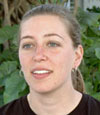| |
|
|

|
|
ATLAS |
|
|
Assistive
Technology
Laboratory
at
Stanford |
|
|
|
Technology
and design benefitting individuals with disabilities and older adults in the
local community |
February 12, 2016 |
|
|
|
|

Perspectives is the newsletter of the
Stanford course,
Perspectives in Assistive
Technology.
This issue invites you
to attend the next class session.
Perspectives in Assistive Technology is a Winter
Quarter Stanford course - now in its tenth year - that explores the design,
development, and use of assistive technology that benefits people with
disabilities and older adults. The schedule
consists of semi-weekly classroom discussions; lectures by
notable professionals, clinicians, and assistive technology users; tours
of local medical, clinical, and engineering facilities; an assistive
technology faire; and a film screening.
Next class
session - Tuesday, February 16th at 4:30pm (new starting time):
|

|
The Design and Control of
Exoskeletons for Rehabilitation
Katherine
Strausser, PhD
Ekso Bionics - Senior
Controls Engineer
|
|
Abstract:
"Robots once were a dream of the future, but they now creep into all aspects of
our lives, whether it be vacuuming our house or exploring distant planets.
Rehabilitation and mobility are no different. Exoskeletons can provide the
motion and support that a user cannot, supplementing or replacing their muscles
to enable natural motion. These devices can be used for mobility or for
rehabilitation, but both uses come with challenges. I will discuss the design
and control of robotic exoskeletons and the challenges faced when designing
these devices." |
|
Biosketch:
Katherine Strausser holds a Bachelor's degree from Carnegie Mellon
University and a Master's and PhD from the University of California, Berkeley.
She was one of three primary inventors of Ekso 1, an electro-mechanical lower
extremity exoskeleton and is currently a senior controls engineer at Ekso
Bionics working on control algorithms and software for various research efforts
focusing on the Human Machine Interface. |
|
Suggest a project -
Good assistive technology project suggestions are sought for Stanford's
Mechanical Engineering capstone course (ME113) for the upcoming Spring Quarter.
Your suggestions should be based on an observation or experience of a real
challenge faced by individuals with a disability or older adults.
Projects will involve the design and fabrication of a
functional solution to the problem, as well as student team presentations and
reports.
This is a great opportunity for individuals,
organizations, or companies to interact with teams of talented, enthusiastic
seniors, benefit from their fresh perspective, and gain access to university
expertise and resources. Students benefit by having the opportunity to apply
their studies of solid and fluid mechanics, manufacturing, and mechanical
design to a real world problem.
Your first step is to visit the
Project Solicitation webpage for a list
of project requirements and a description of how best to convey your ideas. If
your suggestion is accepted, you will have the opportunity to offer the student
team advice, direction, and expertise in person or by phone and/or
email. |
 |
|
|
Attend a lecture -
Course lectures will be held on Tuesdays
and Thursdays from 4:30 to 5:50pm and are open
to the greater Stanford community. You are most welcome to sit in on class
sessions that interest you. You need not be a Stanford student and there is no
required signup, enrollment, or charge. The class will meet in a large, tiered,
accessible classroom on campus in the Thornton Center, adjacent to the Terman
Fountain and near the Roble Gym, the same venue as last year. Here are the
parking options, maps, and directions to
the classroom. |
 |
|
|
Did you miss a
lecture? - Course lectures are posted on YouTube. To find the links,
browse to the Lecture Schedule webpage,
scroll down and click on the lecture of interest. Near the bottom of the page
you will see the Lecture Material section which has links to the slides,
photos, weblinks, and lecture video. |
 |
|
Would you like to support the
course? - Funding in any amount for the course and student projects
is always welcomed. Monetary gifts support approved project expenses,
administrative costs, honoraria for guest lecturers, and the end-of-term
celebration. Refer to the Team Project Support
webpage for more information.
Do you have a question,
comment, or suggestion? - If you have general questions, comments,
or suggestions about the course, David L. Jaffe, MS, the instructor, can
be reached by email or at
650/892-4464. Thank you again for your interest in the course.
Dave
|

To unsubscribe from this newsletter, please email
Dave. |
|







